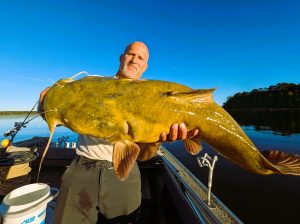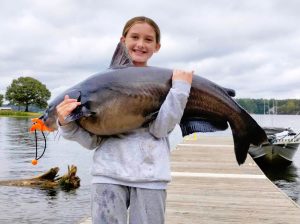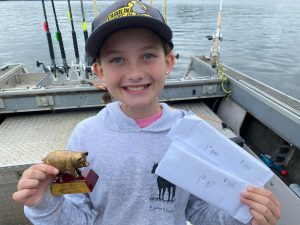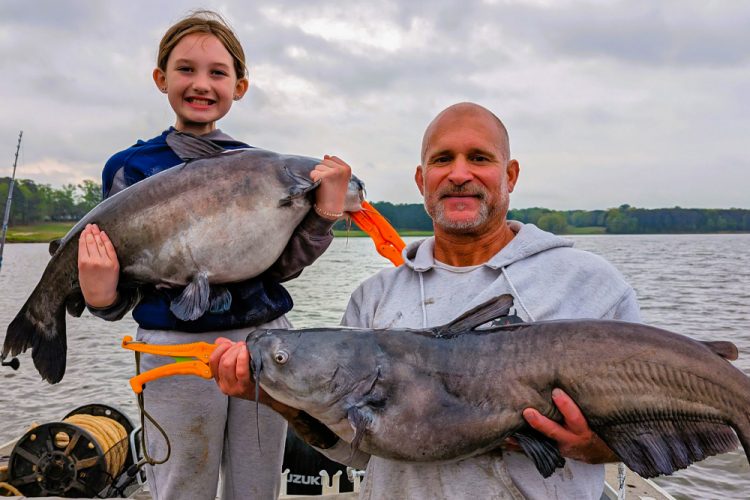The Miller catfishing Tournament Team with a couple of big blues from Badin Lake in North Carolina.
Becoming a Catfish Tournament Fisherman
by Terry Madewell
Fishermen who want to test their catfishing skills can begin fishing tournaments, but a plan of action before beginning can help them reach their goals.
So, you want to become a tournament catfisherman? Tournament catfishing pits catfish anglers head-to-head on the same water, at the same time, all trying to catch a few, big catfish.
If that sounds like fun; it is. But if you think it’s easy; you’re wrong.
Various ways exist to become a successful catfishing tournament angler, and no specific formula enables an angler to become a successful tournament winner. The process is highly individualistic and begins with assessing the hands-on fishing experience of the wannabe tournament angler. It requires considerable catfishing experience to become competent in the sport, so time allocated to the endeavor is crucial and diligence vital.
Goals play a role in terms of competition-level results. Is being competitive in terms of winning the goal? Is being good enough to compete and enjoying the catfish-tournament/comradery a successful outcome?

Either goal, or any level in between, is totally acceptable but should be defined. And goals can be changed as anglers and their competitive skills evolve.
Examining how two members of the same North Carolina family became successful tournament catfish anglers via different routes can help anglers chart their own course to becoming a tournament angler.
Brandon Miller from Gold Hill, North Carolina has fished most of his life and was a successful angler for multiple species of fish. But Miller decided to get involved in tournament catfishing, and for him, the goal was to learn how to compete with the best.
“My first few tournaments were simply the start of a long learning curve,” Miller said. “I found a tournament trail on the Yadkin River Chain of lakes near where I live so it would be easy to fish the tournaments, and that was a good move on my part. I knew the basic layout of the lakes from prior fishing, but I was in the early stages of learning the intricacies of catfishing. Especially for targeting big catfish as required to win tournaments.”
Miller knew his two favorite lakes, Badin and High Rock, both had excellent catfish populations. Badin Lake is known for big blue catfish, and High Rock is a haven for fat flatheads. Both have good catfish populations of blue, flathead and channel catfish.
“The diversity of catfish species close to my home enabled me to learn about targeting the bigger blues and flatheads, and their different preferences,” he said.
Miller entered tournaments with a mindset of learning the basics of catching big catfish. That meant going to tournaments, fishing hard and at the end of the day talking and listening to other catfishermen while discussing tactics employed that day—both successful and unsuccessful.

“I didn’t want to learn anyone’s spots. I wanted to understand what to look for, how to rig and the best baits to use at various seasons so I could find and fish my own places,” he said. “The post-tournament key was to then go fishing and test ideas and tactics. I had to learn patience, but by being diligent, fishing often and tweaking things I’d learned to fit my personal style of fishing, it began to click.”
Miller said the mental process of learning what to look for as patterns change during the year began to make sense the more time he spent on the water.
“As I became proficient with different techniques, such as drifting, anchoring, rigging and tackle enhancements, my success improved,” he said. “I continually tested new tactics, and that helped me adapt to conditions on tournament day. It sounds simple, but the more effort I spent fishing and learning about catfish and refining techniques, the more consistent my catfishing success became.”
Essentially, the harder he worked, the “luckier” he got.
“I’ll never figure it all out, and that’s good because I love catfishing and learning,” he said. “With consistency, my confidence improved and I began to trust my gut and won some tournaments. That fueled my fire and I’m still working to not get stale in my fishing techniques.”
Part of the motivation to not get stale stems from his tournament partner.

Enter Abby Miller, Brandon’s 12-year-old-daughter who for the past four years has been his partner in catfish tournaments. Abby’s development into a tournament angler is ongoing, but as Brandon Miller said, she is his catfishing tournament partner, not someone who simply fishes with him.
“She’s developed the passion to compete and win,” he said. “To that end, she’s on her own quest to learn everything she can about the fish and the sport and put it into action. She’s not content to just reel in big catfish. She’s a legitimate part of the team. She worked and learned about catfishing and tournaments, and I trust her to cut bait, bait rigs, watch rod tips, drive the boat, spot shad schools and any of the tasks of a tournament fishing team.”
Abby Miller said the allure of fishing with Dad initially motivated her tournament fishing aspirations, but now that’s just icing on her catfishing-tournament cake.
“I’ve grown into enjoying the competition,” she said. “I play sports at school, and I like to win, and I want to win when we ‘re fishing tournaments. I learn a lot when prefishing for a tournament. I watch what Dad does, I ask him ‘why’ a lot, and I’m learning the basics of catfishing, including using the graph.”
Abby said she knows she has an advantage because she can learn from Dad, but she still must put in the effort.
“I’m all in, and I don’t mind cutting bait or getting wet, slimy and cold,” she said. “When we go to a weigh-in, I want to carry the big fish. Winning a tournament, and my first big-fish trophy, was motivation. It makes me want to improve…all while fishing with my dad. I plan to keep catfishing. I hope to take him catfishing with me some day.”
Becoming a tournament catfisherman is highly individualistic but a reasonable goal for anglers. Owning the competitive desire to fish tournaments is the key. This competitive nature, blended with hard work, due diligence on the water and a desire to learn are the core ingredients to becoming a successful tournament fisherman. All that’s left is to define goals, make your plan and enter tournaments.
(Terry Madewell of Ridgeway, S.C. has been an outdoor communicator for over 45 years. He holds a degree in Wildlife and Fisheries Management and has a long career as a professional wildlife biologist/natural resources manager. He’s passionate about sharing outdoor adventures with others.)



